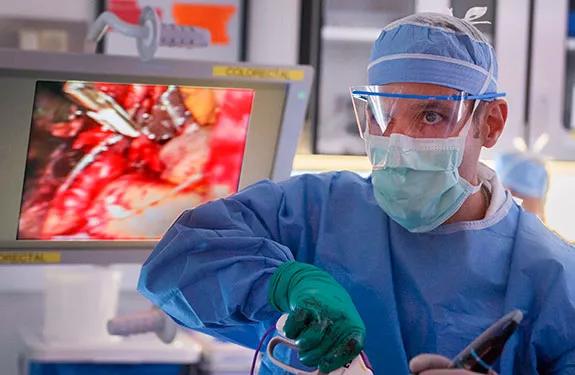Surgical component offers unique benefit

Cleveland Clinic has established a Pediatric & Adult Colorectal Surgery Clinic to help transition young patients with colorectal disorders to adult care.
Advertisement
Cleveland Clinic is a non-profit academic medical center. Advertising on our site helps support our mission. We do not endorse non-Cleveland Clinic products or services. Policy
“Our goal is to provide a multidisciplinary approach for lifelong diseases in order to ensure patients receive the best care from diagnosis to adulthood,” says pediatric general surgeon Anthony DeRoss, MD, who runs the clinic with colorectal surgeon Jeremy Lipman, MD.
A large percentage of patients with inflammatory bowel disease need surgery, and Crohn’s patients require more than one surgery in their lifetime. “When these diseases are present in childhood, the patient will eventually need an adult surgeon. That’s why both adult and pediatric surgeons are involved,” Dr. DeRoss explains.
“We like to get to know our patients before they need surgery. Surgery is better tolerated and the experience is better, if it is scheduled electively, and the patient is not meeting us for the first time in an emergent situation,” he adds.
Patients are generally referred to the clinic by a pediatric gastroenterologist when the patient is nearing the limits of medical management and will need surgery in the near future. But Dr. Lipman feels that an earlier introduction can be invaluable in helping patients prepare for their future.
“We would like to help patients make an informed decision about biologic therapy and surgery before they have failed every medical therapy. This way, they understand the course of their disease, know what to expect and are not frightened by the treatment options,” he says.
The approach seems to work. “We haven’t had a single patient get upset about an IV or heparin shot. In fact, we have been impressed at how well-adjusted our patients are, even though some get a stoma,” he says.
Advertisement
The transitional clinic fills an important role for college-age patients, who are often lost after aging out of pediatric care. Drs. DeRoss and Lipman do not let this happen.
“When these kids leave home, they are tempted to stop taking their medications. They need to understand why this can’t happen,” says Dr. Lipman. “We are there for them when they need us. They understand our goal is to make them feel better.”
Children, teens and young adults up to age 21:
Call the triage nurse at 216.444.8555. Appointments are coordinated with pediatric/adult gastroenterology, pediatric surgery, adult colorectal surgery, nutrition, psychology and the hereditary cancer registry, if needed. All tests will be ordered in advance of the first visit to optimize the appointment.
Advertisement
Advertisement

Benefits of neoadjuvant immunotherapy reflect emerging standard of care

Multidisciplinary framework ensures safe weight loss, prevents sarcopenia and enhances adherence

Study reveals key differences between antibiotics, but treatment decisions should still consider patient factors

Key points highlight the critical role of surveillance, as well as opportunities for further advancement in genetic counseling

Potentially cost-effective addition to standard GERD management in post-transplant patients

Findings could help clinicians make more informed decisions about medication recommendations

Insights from Dr. de Buck on his background, colorectal surgery and the future of IBD care

Retrospective analysis looks at data from more than 5000 patients across 40 years